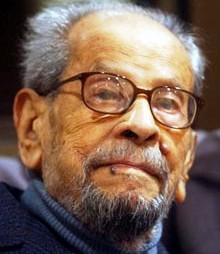Director, Egyptian fans find common ground on Mahfouz novel
 Cairo - Egyptians who flooded a cinema hall in downtown Cairo were curious to watch a movie based on a masterpiece by Nobel Prize-winning writer Naguib Mahfouz, especially because the film adaptation had a Mexican flavour.
Cairo - Egyptians who flooded a cinema hall in downtown Cairo were curious to watch a movie based on a masterpiece by Nobel Prize-winning writer Naguib Mahfouz, especially because the film adaptation had a Mexican flavour.
Directed by Arturo Ripstein, The Beginning and The End is based on a Mahfouz novel of the same title. The 1993 film tells the story of a middle-class Mexican family struggling against poverty after the death of the husband and father.
However, it seemed many audience members were not able to forget totally about the 1960 Egyptian film version.
"Salah Abou Seif's film has been part of our history and culture for so long. It was hard for me not to think of it while watching," said Noha Fathi, a 22-year-old arts student.
Noha and others enjoyed the movie and found only scattered scattered differences in the details of the story.
"Knowing the original story made this film feel a bit weird, but I know that Ripstein's film targets the Mexican audience," Noha said.
Ripstein's film was screened publicly in Cairo as part of the 32nd Cairo International Film Festival (CIFF), which ends Friday.
In the Mexican version, desperate mother Ignacia chooses to sacrifice the destiny of three of her children in order to protect Gabriel, the fourth. She believes Gabriel will climb the social structure and restore the family's lost fortune. But destiny has other plans for the Boteros family.
Ripstein, whose films are often described as depressive explorations of the loneliness of the soul, told reporters Thursday in Cairo that he had only seen the Egyptian version, without subtitles, a few years after filming his own adaptation.
The 65-year-old director said that the difference between the two filsm is the same as the difference between an "Egyptian adaptation and French or Italian one to a text by William Shakespeare".
Ripstein, who is honoured by the CIFF, said that he decided to do film the story after reading an English translation of Mahfouz's novel.
But there was more to his enthusiasm than the English translation. Ripstein admitted he was fond of Egyptian cinema of the 1940s and '50s and the films of late director Youssef Chahine.
"And the Egyptian and Mexican cinema are not that different, especially concerning the use of music and the atmosphere of storytelling," said Ripstein, who won the Golden Seashell at the San Sebastian International Film Festival for The Beginning and The End.
However, some Cairo moviegoers expressed discontent with the Mexican film, describing it as "too long" or "boring." Others struggled to accept the differences with the familiar, Egyptian original.
In the Mahfouz novel and the Egyptian film, which was nominated for the grand prix at the Moscow international Film Festival in 1961, the Boteros sister takes her own life by jumping into the Nile. The Mexican version has her slitting her wrists.
Ripstein and his wife, who wrote the script of the movie, said that this was one of the things they had to change.
"We do not have a river. Committing suicide in front of the train was one of the alternatives, but the police refused, saying that people will get inspired by the film," he said.
"I would love to produce other films based on Mahfouz's novels, because the Mexican audience can easily relate to them." (dpa)